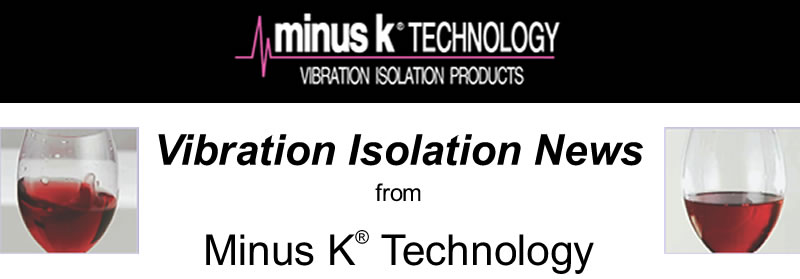
Number 9, September
2011

What's Here for You:
Vibration Isolation News is designed to keep our customers and friends up to date on the latest products and applications designed to facilitate better measurements and improved nanomanufacturing. We are an OEM supplier to leading manufacturers of scanning probe microscopes, micro-hardness testers and other sensitive instruments, and we have users at more than 200 leading universities and private and government laboratories in 40 countries.

INDEX
1. Negative-Stiffness
Vibration Isolation Helps Large Growth Crystals
2. Featured
Product: Small But Mighty BM-10
3. Press
Release: New MK52 Vibration Control Optical Table
4. Minus K is a Veteran Owned California
Certified Small Business
5. Upcoming Nanotechnology
Meetings and Webinars
6. We want to hear from YOU

Minus
K Technology currently builds
vibration
isolators to handle payloads from
3 lbs to 10,000 lbs (per isolator).
When you need the best isolation for your dollar.
Our
patented technology will provide you true 1/2 Hz performance.
Give
us your challenge.

Negative-Stiffness Vibration Isolation Facilitates Growth Of Large Crystals For Field-Portable Gamma Ray Spectrometers
By Jim McMahon
Excerpted from Photonics
Online - July 2011
At Kansas State University, a unique facility is dedicated to the research and development of new and innovative radiation detector technologies. The Semiconductor Materials and Radiological Technologies (SMART) Laboratory is the largest university-based radiation detection laboratory in the country. It focuses on the detection of neutrons and gamma-rays, primarily those from special nuclear material (SNM) for homeland security applications. SMART Lab investigates and fabricates a variety of detectors which include compact low-power neutron detectors, high-resolution room-temperature-operated semiconductor gamma ray spectrometers, pixelated devices for gamma ray or neutron imaging, and miniaturized gas-filled detectors. The laboratory builds detectors from start to finish in readily deployable packages for use in better securing our borders from nuclear materials such as plutonium and uranium.
The gamma ray
detection aspect of the laboratory's research is focused
on the discovery and development of new dense, high-Z* semiconductor
materials, such as cadmium zinc telluride (CdZnTe or CZT)
and mercuric iodide (HgI2), and several scintillator materials
including lanthanum tribromide (LaBr3) and cerium tribromide
(CeBr3). Research conducted on large crystal growth with
high-Z semiconductor and scintillator materials has produced
large crystal ingot yields. (*The atomic number which uniquely
identifies a chemical element is represented by the symbol
Z. Also known as the proton number, it is the number of
protons found in the nucleus of an atom and identical to
the charge number of the nucleus.)
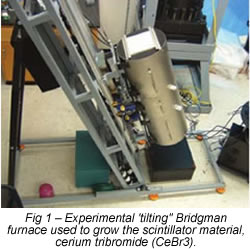 Growing Giant Crystal At the
SMART Laboratory, crystals of CdZnTe and the scintillator
materials are grown via a vertical Bridgman furnace.
In this process, molten material is directionally
solidified from one end to the other to produce
a large-volume ingot that is a single crystal. Methods
to grow CdZnTe for gamma-ray spectrometers have
been explored since the early 1990s, yet a reliable
system to produce large crystals at an economical
cost has not been achieved until relatively recently. Higher
ingot yields enable smaller, faster and more accurate
sensors, and allow gamma-ray detectors to be more
economical and field-portable - benefits that can
have a significant impact on national security objectives.
Radiation detectors using CZT can operate in direct-conversion
(or photoconductive) mode at room temperature.
Growing Giant Crystal At the
SMART Laboratory, crystals of CdZnTe and the scintillator
materials are grown via a vertical Bridgman furnace.
In this process, molten material is directionally
solidified from one end to the other to produce
a large-volume ingot that is a single crystal. Methods
to grow CdZnTe for gamma-ray spectrometers have
been explored since the early 1990s, yet a reliable
system to produce large crystals at an economical
cost has not been achieved until relatively recently. Higher
ingot yields enable smaller, faster and more accurate
sensors, and allow gamma-ray detectors to be more
economical and field-portable - benefits that can
have a significant impact on national security objectives.
Radiation detectors using CZT can operate in direct-conversion
(or photoconductive) mode at room temperature.
Vibration
Isolation
Critical to maximizing ingot yield is maintaining
a stable crystal growth process through the elimination
of external vibrations.
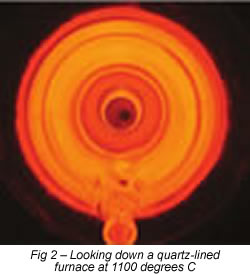 "The
general consensus within the crystal growth community
is that uncontrolled vibrations can destabilize
the growth interface," says Professor Mark
Harrison with SMART Lab. "As the material is
freezing from bottom to top, there is an interface
between liquid and solid, and it sets up a natural
convection flow that is ideal for growing a big,
single crystal. If a vibration disturbs the liquid
directly above the forming crystal solid, it can
change the convection patterns and multiple crystals
will form from the previous single crystal. Which
is contrary to our purpose of growing large, single
crystals."
"The
general consensus within the crystal growth community
is that uncontrolled vibrations can destabilize
the growth interface," says Professor Mark
Harrison with SMART Lab. "As the material is
freezing from bottom to top, there is an interface
between liquid and solid, and it sets up a natural
convection flow that is ideal for growing a big,
single crystal. If a vibration disturbs the liquid
directly above the forming crystal solid, it can
change the convection patterns and multiple crystals
will form from the previous single crystal. Which
is contrary to our purpose of growing large, single
crystals."
"We looked into various active and air table
vibration handling systems, and eventually selected
Negative-Stiffness vibration isolation," continues
Harrison. "One of the concerns we had was surface
waves coming across the ground, which induced vibration
in the crystal growth system,
"We are located in a basement," Harrison says. "Before we got the NSM system, I could actually see somebody walking down the stairs through the walls with a seismometer. With the Negative-Stiffness system in place, I can't even tell when they are shelling at the nearby Fort Riley military base.
Improving
Detection of Special Nuclear Materials
Gamma ray detectors have been around for years, but they
are either very low efficiency, poor performance or they
require liquid nitrogen cooling, such as those employing
germanium. Imagine the difficulty required to take liquid
nitrogen into a remote desert searching for special nuclear
material.
"What we
are trying to do at SMART Lab is make it more feasible,
more economical for these detectors to be put in place at
every critical check point, at every airport and shipping
port," Harrison says. "This will increase the
possibility of detecting and intercepting shipments of special
nuclear material, should they occur."
The full
article can be found at: https://minusk.com/content/in-the-news/PhoOn_0711.html

Featured Product: The Compact BM-10 Is Now
Stronger!!!
Minus K has increased the range on
our most compact standard isolator.With minimal re-engineering
we have been able to bring our BM-10 isolators up to 100
lbs and is proud to introduce our new BM-10 models, the
75BM-10 & 100BM-10.
We
have been asked for heavier capacity BM-10 isolators for
some time. Previously we have been able to get to 65 lbs,
but now we are pleased to announce that we can get over
100 lbs in this compact low height isolator without significantly
increasing the price.
The
BM-10 offers a 1.5Hz horizontal natural frequency and
our signature 0.5 Hz vertical natural frequency. There
are only two adjustments. The BM-10 is perfect for
new generations of small SPM's that require the highest
performance in a very compact system
These new BM-1 Models are now offered in both of our popular workstations, the WS-4 and MK26.
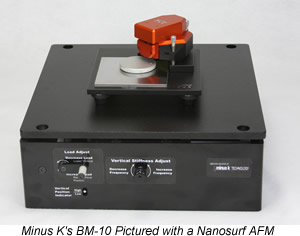
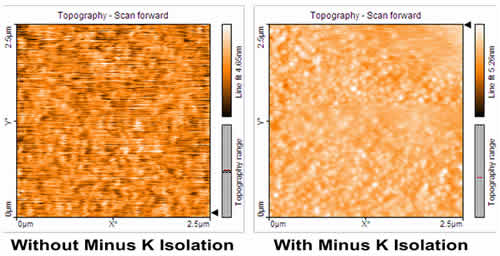
The
above images where captured by a nanosurf AFM without
isolation and with a Minus K BM-10
| Load Capacities (approximate): | ||
| Model | Payload Range* | Price** |
| 10BM-10 | 0 - 10 lb (0 - 4.5 kg) |
$2,530 |
| 25BM-10 | 10 - 30 lb (4.5 - 14 kg) |
$2,585 |
| 50BM-10 | 30 - 55 lb (14 - 25 kg) |
$2,640 |
| 75BM-10 | 50 - 80 lb (22.7 - 36.3 kg) |
$2,695 |
| 100BM-10 | 75 - 110 lb (34 - 50 kg) | $2,750 |
| *Contact Minus K for custom payload ranges. |
**For International Orders, A Handling Fee
of 5% is Added. |
|
Specifications:
Weight:
Approximately 35 lb (16 kg))
Dimensions:
12.2” W x 12.2” D x 4.6” H
(310mm W x 310mm D x 117mm H)
Performance
- Horizontal
frequencies are weight dependent.
- Horizontal
frequency of 1.5 Hz is achieved at the upper limit
of the payload range.
- Vertical
frequency is tunable to 0.5 Hz throughout the payload
range.
https://minusk.com/content/products/standard/bm-10_vibration_isolation_table_anti_vibration_tables.html

New MK52 Negative-Stiffness Optical Vibration Isolation
Table
Press Release: September 2011
Minus K Technology has partnered with Kinetic Systems, Inc
in designing a new, versatile, ultra-low-natural-frequency
optical table isolation system. The MK52 negative-stiffness
optical table achieves 0.5 Hz or lower vertical and horizontal
natural frequencies without limiting its ability to support
static loads. When adjusted to a 0.5 Hz natural frequency,
the MK52 achieves 93% isolation efficiency at 2 Hz, 99%
at 5 Hz, and 99.7% at 10 Hz.
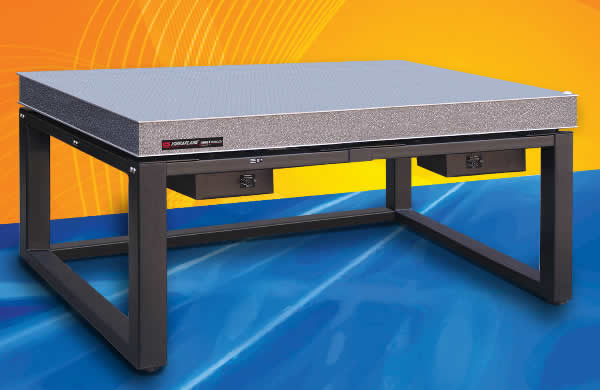
The MK52 Optical
Vibration Isolation Table can be configured for a wide variety
of locations and applications - wherever external vibrations
can adversely affect the operation of sensitive equipment.
Ultra-low natural frequencies, high internal structural
frequencies, and excellent vertical and horizontal isolation
efficiencies make the system well-suited to applications
such as analytical balances, cell injection, confocal microscopes,
patch clamping, optical microscopes, wafer probing, sensor
calibration, and laser applications in fields such as semiconductor
processing, telecommunications, aerospace engineering, and
medical research. The MK52 is also ideal for applications
requiring high resolution, such as Raman spectroscopy, atomic
force microscopy (AFM), AFM-Raman integration, and micro-hardness
testing.
The MK52 is available in table sizes up to 4' x 8' with
gross load capacities up to 2000 pounds (909Kg) (larger
optical table sizes will be considered). Tables are constructed
with a 3/16" thick ferromagnetic stainless steel top
skin, 3/16" thick carbon steel bottom skin, and plated-steel
precision honeycomb core.
Customization
options include guard rails, padded armrests, overhead equipment
shelves, monitor stands, non-isolated shelves for supporting
equipment off the tabletop, seismic restraints, auxiliary
work surfaces, retractable casters, Faraday Cages, and tabletop
enclosures to protect against harsh manufacturing environments.
Check out all the specifications at: https://minusk.com/content/products/standard/mk52_optical_tables_vibration_isolation_systems.html

News: Minus K Technology Is Veteran Owned and Certified California
Small Business
Minus K is a Veteran Owned Small Business.and
a certified State of California Small Business. All our products
are proudly made in the USA.
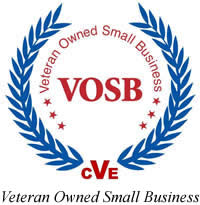

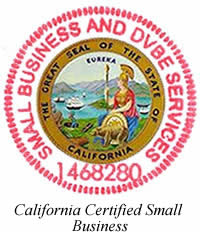

Comments/Suggestions: Applications in New Fields or Features of Interest to You in Our Next Newsletter:
Upcoming Meetings and Webinars:
 |
|
||||||||||||||||||||||||||||||||||||||||||||||||||||||||||||||||||||||||||||||||||||||||||||||||||||||||||||
Click
Here To Join Us Now On Facebook ![]()

We want to hear from you:
Tell us if you have had a great experience with our isolators.
Work with us on an article about how negative-stiffness has helped
you. Don't be shy. Share your application with our readers.
Do you have an application in a New Field? What applications are
of Interest to You?
Email us at newsletter@minusk.com

460 S. Hindry Ave., Unit C Inglewood, CA 90301
Tel: 310-348-9656 Fax: 310-348-9638
Contact Us www.MinusK.com
© Minus K Technology Inc., Vibration Isolation
Systems. All rights reserved.